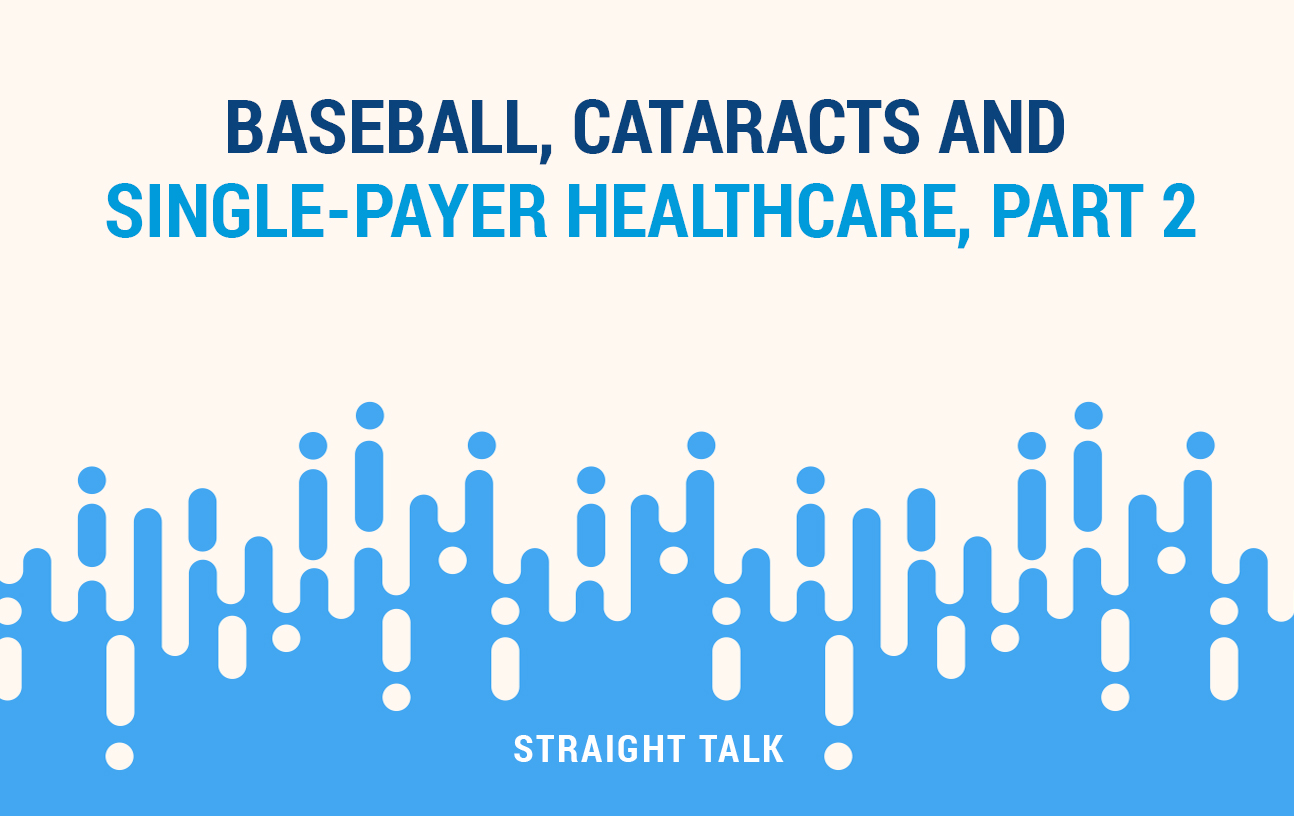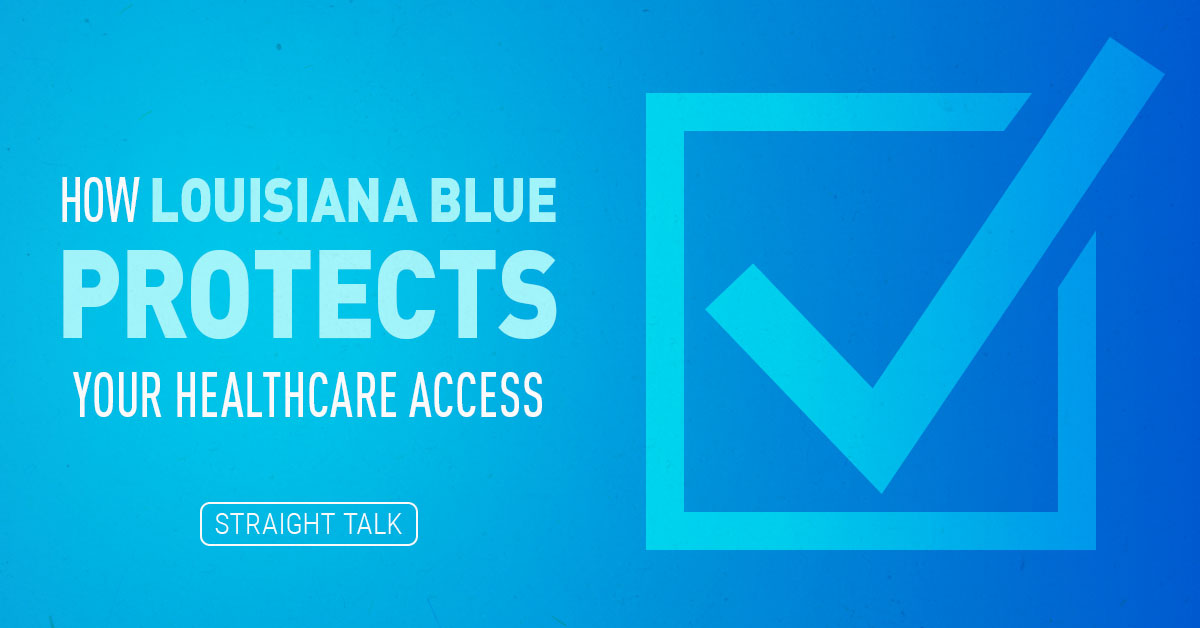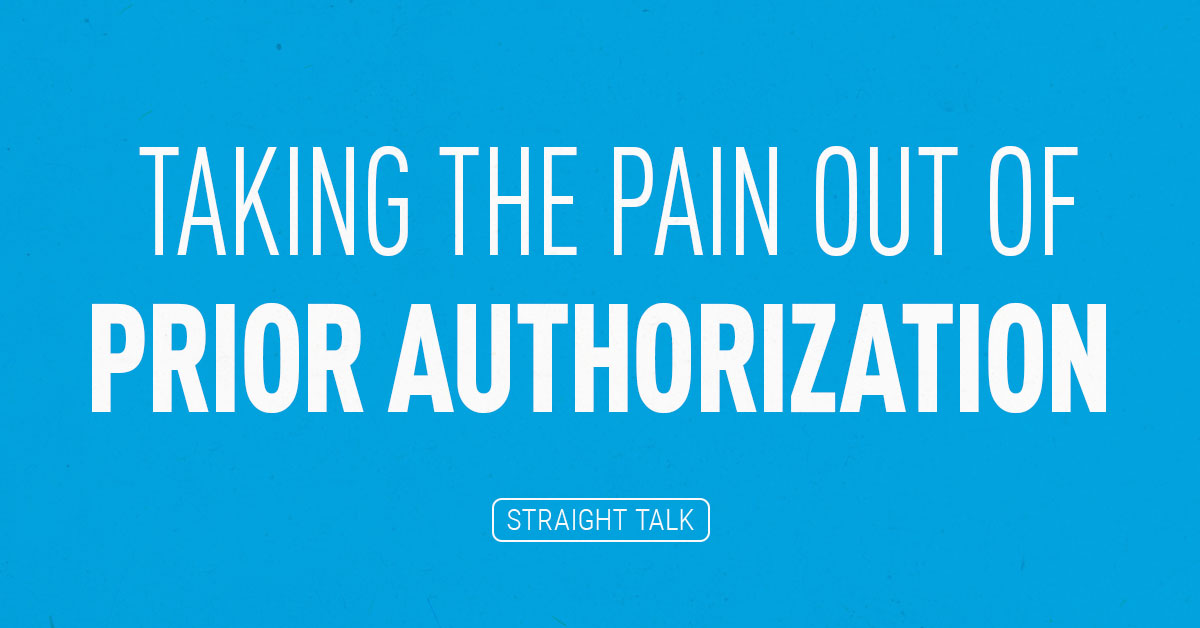In the last installment of “Straight Talk,” I shared with you some amazing things that recently happened with my eyesight. I had cataract surgery and my ophthalmologist returned my eyes to 20/20 vision for the first time in 50 years!
As I was going through the process, astounded at how good and fast it was, I couldn’t help but wonder how other countries handle cataract surgery, which is a common medical need as people age, especially the countries with more government involvement in paying for healthcare. A model of single-payer, government-run healthcare in which the private insurance we have today would be eliminated or at least restricted is gaining popularity in polls, like this one from the Reuters. So how would a single payer health plan change the patient experience to have their eyesight restored?
Oh Canada, That’s a Long Time to Wait
Let’s start with our friends north of the border in Canada. Canadians receive healthcare through a program taxed and financed by the provincial (state) governments all over their country. Canadians then access healthcare without out-of-pocket costs for many services.
The outcomes, results and waiting times for many procedures financed by the government system are tracked by the provincial governments and interest groups like the Fraser Institute. Once I understood how each group’s data on wait times was computed, I found very little variation between them.
“So Mike, that’s interesting and all, but what if you had been in Canada instead of here on your Blue Cross plan?”
In Canada, I would have started the process of getting cataract surgery with a visit to my primary care physician. That doc would examine me and then refer me to an ophthalmologist IF he thought my cataracts were sufficiently thick and dense to interfere with my daily life. Primary care visits are pretty quick in Canada; typically just a couple of weeks to get in. Of course, if my PCP didn’t think my cataracts were bad enough, that’s where this story would end.
If referred, I would get an ophthalmologist appointment about eight to 24 weeks after the referral from my PCP, depending on which province I lived in. About 50% of Canadians assigned to an eye doc have an appointment in 11 weeks or longer after their PCP visit. At that appointment, the doc would test my eyes and IF she or she determined the cataracts were a significant barrier to my daily activities, then I would be able to schedule surgery for many weeks later.
Government-funded cataract surgery in Canada is a bit different than it is here. First of all, I would have had to wait another 12 to 44 weeks1 to get my first eye done (average was about 27 weeks). Then eight weeks later, I would get the second eye done.
The Canadian plans do NOT pay for replacement lenses that correct your vision; they simply remove the cataract. So I would have clearer vision but still be wearing the very thick glasses I went in with. If I wanted corrective lenses, I would have to pay completely out of pocket for those, as opposed to here, where Medicare and private insurance cover them.
To sum up, Canadian patients with cataracts wait up to 48 weeks from the time they make their primary care provider appointment until their surgery is complete. Or to put it another way, 11+ months. That’s 11 months where they could still fall down, read the wrong prescription label or not be able to drive – and that’s if the providers determine their eyes are bad enough to warrant the surgery in the first place. If not, they need to wait until their eyes get worse enough to be referred for surgery.
And, Canadians who do have the surgery get inferior outcomes because there is no vision correction included. But, it is totally free (besides the taxes you pay) while you are going through it.
Oh Say Can You See in the U.S.
Compare that to my experience here.
First of all, I didn’t have to go to a PCP to gate keep my eyes; I made an appointment directly with an ophthalmologist who saw me within two weeks. Two weeks after that, I had my first eye surgery; 30 days later, I had the second. Overall, from the time I made my first appointment to the complete second eye was eight weeks. And my insurance paid for the surgery AND corrective lenses, so no more glasses for me except to see within three feet.
Today, there are 146,000 people on any given day in Canada2 waiting to have their eyes cleared (not corrected) under their government-issued plan, and most will have invested nearly a year before they can see again.
God Save the Queen’s Eyesight
Ok, Mike, but what about in the U.K.? Their health system is government funded and managed too, right?
Computing the wait times in the United Kingdom for cataract surgery is a bit trickier. There are big variations in the different regions, and the National Health Service (NHS) has a “guaranteed specialist maximum waiting time” of 18 weeks. But, this goal is rarely actually reached.
In Wales, for example, in 2014, more than 50% of eye patients were waiting more than 36 weeks to see an ophthalmologist simply for their appointments, without factoring in the waiting times for the surgery. They’ve recently improved on that, but about 20% of eye patients in Wales waited more than 26 weeks to start treatment in 2017 and 2018. That was AFTER referral.
Just a few years ago (in 2016), the U.K.’s Telegraph reported on a study from the Royal National Institute of Blind People that the NHS has resorted to a “lottery” because the demand for cataract surgery had so far outstripped providers’ capacity to perform them. Wait times have ballooned to 15 months for this “nonessential” surgery. That’s a nice way of saying someone in charge was rationing the treatments out to the neediest patients.
In fact, the criteria listed in the article for deciding who needed vision surgery most included things like “how many falls they have had.” In some areas of England, those “pushed up the list” could have surgery in as little as two weeks. But, rationing is in full swing because their population, like ours, is aging and there simply aren’t enough healthcare providers or resources to provide the services through the government health plan in the needed volumes. Government-financed healthcare is also government-MANAGED healthcare, in most cases.
On a good note, cataract surgery under the NHS in the U.K. does include corrective lenses, so most folks there do not end up wearing glasses for distance vision after surgery.
As you can see, the two systems most often held up to us as potential models for America in terms of financing and managing healthcare don’t seem to be handling this critical surgery (what’s more important than your actual vision?) anywhere near as well as here.
Which brings up another question: Is cataract surgery more expensive here or there?
But What Does It All Cost?
As you know, Blue Cross negotiates rates with healthcare providers for their services. The insured rate Blue Cross came up with for my basic cataract surgery worked out to about $1,500 per eye. That’s right at $3,000 for the basic, vision-correcting surgery.
Now, full disclosure, I elected to invest more money into a special, astigmatism-correcting lens and laser surgery for one of my eyes, running that total up another $2,000, which I paid out of pocket. It was my choice to make sure I wouldn’t need glasses afterward.
The Telegraph article estimates that cataract surgery in the U.K. runs £1,000 per eye (in 2016) or roughly $2,527 U.S. in today’s dollars for two eyes. That’s actually very comparable to the rate an insurance company would negotiate on your behalf here in the U.S.
Of course, in the U.K., where healthcare is funded by a 20% tax on every transaction, the patient pays nothing when they have treatment; they simply have to wait until their number comes up. In our system, you might have a deductible or coinsurance depending on your plan and what time of year you have the surgery done, but you can have the surgery done whenever you want here in the U.S.
These are important considerations. We need to take them seriously.
So, the next time a politician starts talking about “government-run healthcare” or “single payer” or “Medicare for All,” you might want to consider how that’s going for the countries that have been at it for many years, the ones we supposedly want to MODEL our future healthcare upon. Like Canada or the U.K.
Straight Talk is I’m VERY glad I had everything done to my eyes HERE. You should be too!
1 Waiting Your Turn: Wait Times for Health Care in Canada, 2018 Report, page 16
2 Waiting Your Turn: Wait Times for Health Care in Canada, 2018 Report, page 56





Why is it that we always use Canada and the UK as the examples? They clearly have room for improvement, especially when it comes to wait times. Are there other European countries (maybe France) that have single payer health systems that are having better success?
Mary! Thanks so much for reaching out!
While no country on earth has a true “single payer” system where every single citizen has their healthcare paid for 100% by their government, the UK and Canada are the closest to that standard. Other countries in the developed world either have a doctor population that looks nothing like ours, or they have hybrid plans with government/private partnership (like Medicare is nowadays) or they have very limited capabilities in specialty care or specialty drugs.
I refer to the UK because globally it is held up as the model of what Single Payer can achieve in its purest form. So when you hear politicians speaking about “Single Payer” or “Medicare for All” if you ask them which country they are thinking of, the majority of the time those are the countries they will refer to.
In France, for example, the typical coinsurance for your treatment is 30-50%. So even with the government insurance, you can be billed 30% of your treatment costs with no limit. That’s not a system we’d want to emulate I’m thinking. Likewise your drug coinsurance can 15, 30, 50, or 85% of the drug’s actual costs with no annual maximum. Many in France buy private insurance anyway PLUS pay the taxes that drive the national system. One good aspect of their system that I would like to emulate here, is all medical providers MUST post their prices, since the Fed is paying a fixed % and you must pay the rest.
Believe me, we study every system to look for better ways to do things. The bottom line is, healthcare here is more expensive because medical providers charge more for it, and a growing patch of the population is getting access to it below wholesale (Medicaid). Docs, hospitals, drug companies, all charge more here than in other countries.
So if we are going to change the system, there will be trade-offs. My job is to make sure we as a nation go in with our eyes open. No ugly surprises on something as important as healthcare!
Thanks again for reaching out!…mrb
I had cataract surgery on both eyes in 09/2016. I am younger so the cost out of pocket was 11000 US. I went to Carecredit, got 24 months zero interest and pay less per month that most would pay for vision insurance. It took less than 3 weeks and I see 20/15 in both eyes with no readers. A success I would say. Negotiated care is usually far far cheaper than insurance, especially with the O Care boondoggle. Thanks for the story!
Steve!
Thanks for your comments here. I have a high deductible health plan for me and my family, and even if I had paid for $0 healthcare during 2018, my payments for my cataract surgery would have still be much, much less than the $11,000 you quoted. I completely disagree with you that negotiated care is “usually far far cheaper than insurance”, especially with our discounts, and especially if you are in a situation where you need chronic care, instead of once in a while surgery. While you might think you can get a better deal than a Blue Plan pays, our research here has shown that is never the case. Perhaps with other carriers, but not with BCBSLA.
Glad your surgery went well! I’m enjoying mine too!….
I’m in the VA system, which is a single payer system with some copays. Depending on when you served, your military injuries, or your income, a patient can pay some (quite reasonable) copays, or more copays, or none at all. As an example, I pay a $20 copay for my blood pressure meds for a three month supply. I could also have the VA pay for my allergy pills, but I can buy a year’s supply for about $14. It would be silly to pay out $80 for the VA to mail them to me.
Two years ago I made more money than the financial numbers specify. I’ll probably end up paying copays for specialist visits ($5o each) and hospital stays (a per-day charge). But last year I made less again, so those charges will not happen for 2018.
My care is pretty good. I’m in one of the regional systems considered to be top-tier in quality and outcomes. But if you need something that isn’t critical, be prepared to wait. I needed hernia surgery. I had a bulge that looked like someone stuck a softball inside my belly. My primary care doc was reluctant to refer me, but did. It took about 3 months to see a surgeon. He took one look and told me I needed surgery. I waited about 8 months for a slot. My results were great, but I waited nearly a year, because it wasn’t critical.
The VA has a new program that will refer to outside care if wait times are too long. I was offered this for an eye issue, but declined, because I just didn’t want to deal with all of the paper and to have to create a new relationship with the outside clinic. My wait wasn’t that annoying. My doctor did tell me I’m developing a cataract in one eye, though.
Gordon!
Thanks so much for your comments, and enlightening me about the VA system. I’m a huge fan of quality veterans care, and you are an angel for waiting a solid year to get that hernia fixed, I doubt you’d find many other folks willing to wait so long. In fact, the biggest research study we can find on Single Payer, done just a couple of months ago by Kaiser Family Foundation, showed that the support for more government insurance dropped from 70% to around 20% if we even mentioned “longer wait times” (inevitable) or “Higher taxes” (required to make it go). So the VA is lucky to have understanding folks like you in its rolls. The average American with health insurance would never be so patient in my opinion.
Thanks so much for reading Straight Talk!…..mrb